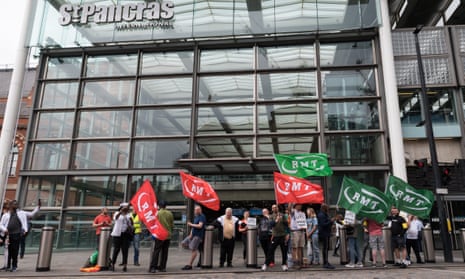As rail workers from the RMT union strike over pay and conditions, government ministers have said they are already particularly well paid.
The transport secretary, Grant Shapps, cited an average salary of £44,000 – a figure that includes the train drivers, who are not part of this week’s national strike. However, rail bosses account for eight of 10 of the highest paid people in the public sector, while chief executives of private rail firms take home even more. So who exactly earns what in the railway?
The striking rail staff
The average RMT member in rail earns about £33,000, according to the union – taken across every role, from in-house cleaners and onboard crew at train operators, to maintenance roles and signallers at Network Rail.
The average signaller earns £44,000, according to Network Rail. The average pay for a maintenance worker is £31,000, and the overall average for Network Rail RMT members is £36,000.
Salaries around train companies vary. One long-distance train operator pays about £23,000 for a station assistant, £25,000 for a customer service host, £32,000 for a conductor, and £38,000 for a train manager.
Another train operator based in the south-east pays between £21,000 and £30,000 to station staff as a baseline. Higher rates are paid to those working in central London and doing antisocial shifts: staff can earn £3,000 to £4,000 more in London weighting and roughly the same again for flexible shifts. Platform and gateline staff are on the lowest salaries, with ticket office staff earning £24,000 to £26,000 and controllers at the terminals earning about £30,000.
Most cleaning staff are now employed by outsourced firms such as Churchill and are paid the minimum wage.
Other national rail workers
The figure quoted by Shapps is the median figure from the Office for National Statistics (ONS), which also includes higher-paid train drivers. Without drivers, the figure is £36,800, according to an ONS figure supplied to the BBC. But that number doesn’t include some roles such as cleaners, the RMT says.
The Transport Salaried Staffs’ Association union says it has members working in customer service roles for train-operating companies earning just over the minimum wage, from £18,000.
Middle managers at individual train companies in roles such as planning and procurement can typically earn anything from £55,000-£95,000, with directors on £100,000-£200,000.
Almost half of Network Rail staff earn more than £40,000, with more than a thousand employees earning £80,000-£120,000.
Train drivers
Drivers, who were not (except at Greater Anglia) part of the national or London dispute this week, are normally in the Aslef union and earn more than other workers.
The average salary is £59,000 across the national rail operators. Drivers are on different pay scales at different companies, but the regional variations on the mainland range from £51,000 in Wales to £71,000 for drivers on LNER’s East Coast trains. Most do some overtime, with Sunday shifts usually voluntary.
Drivers on the French SNCF-owned Eurostar earn more, at £77,000 a year.
A driver for London Underground (who, again, were not on strike) earns an average £56,000, according to Aslef.
The management
Network Rail’s chief executive, Andrew Haines, earns £588,000. Wages have fallen for the highest earners in recent years, with Haines taking a substantially lower wage than his predecessor on appointment in 2018.
The chief financial officer, Jeremy Westlake, is the second highest earner at £415,000.
Tim Shoveller, Network Rail’s chief negotiator in the current talks, along with five other route managing directors, earns £335,000.
The salary of Steve Montgomery, representing train operators as the chair of the Rail Delivery Group, and director of UK rail for FirstGroup, the biggest rail operator, is undisclosed, but six train company bosses report to him, making his likely earnings somewhere between £300,000-£400,000.
Train operating firms’ managing directors typically earned packages of between £200,000-£300,000, including bonuses, before the collapse of franchises at the start of the pandemic. According to the most recent accounts of the Go-Ahead-owned Southeastern, before it was stripped of the contract for a £50m accounting scandal, the highest paid director earned £299,000 in 2020.
And other notable figures in rail …
Eight out of 10 of the highest paid civil servants work in rail. The top paid, just ahead of Haines, is Mark Thurston, the chief executive of HS2, who gets a whopping £625,000.
The third highest paid civil servant working directly for any government department – just behind the heads of the armed forces and international trade – is a former rail franchising consultant, Peter Wilkinson, now the Department for Transport’s managing director for passenger rail services, on £255,000.
Graham Sutherland, the chief executive of FirstGroup, is on a package that the group said is significantly less than his predecessor’s £840,000, with a potential (if unlikely) bonus approaching £1m.
Mary Grant, the chief executive of Porterbrook, the rolling stock company that leases approximately a quarter of the UK train fleet, earned a reported £750,000 in 2020.
Mick Lynch, the general secretary of the RMT union, earns £84,000, with pensions and benefits taking his annual package to £124,000.
Grant Shapps, the transport secretary, earns £155,000 as an MP and minister.
